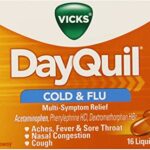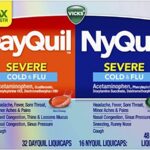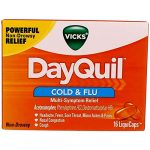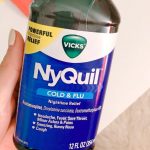Can I Take Dayquil and Alcohol Together?

Throughout the 10,000 or so years that humans have been drinking fermented beverages, they’ve also been arguing about their merits and demerits. The debate still simmers today, with a lively back-and-forth over whether alcohol is good for you or bad for you.
It’s safe to say that alcohol is both a tonic and a poison. The difference lies mostly in the dose. Moderate drinking seems to be good for the heart and circulatory system and probably protects against type 2 diabetes and gallstones. Heavy drinking is a major cause of preventable death in most countries. In the U.S., alcohol is implicated in about half of fatal traffic accidents.
Even in small amounts, alcohol may intensify medication side effects such as sleepiness, drowsiness, and light-headedness, which may interfere with your concentration and ability to operate machinery or drive a vehicle, and lead to serious or even fatal accidents.
Because alcohol can adversely interact with hundreds of commonly used medications, it’s important to observe warning labels and ask your doctor or pharmacist if it’s safe to use alcohol with any medications and herbal remedies that you take.
What is Dayquil?
DayQuil Cold & Flu is a combination product that contains the active ingredients acetaminophen, dextromethorphan, and phenylephrine. It temporarily treats symptoms of the common cold and flu. These symptoms include:
• fever
• cough
• nasal congestion
• minor aches and pains
• headache
• sore throat
DayQuil is made for use during the day. Unlike NyQuil, it doesn’t contain the active ingredient doxylamine, which is an antihistamine that can make you feel drowsy.
How does it work?
Acetaminophen is a fever reducer and a pain reliever. It works by changing the way your body senses pain. It also changes how your body regulates its temperature. Dextromethorphan suppresses your urge to cough. The third ingredient, phenylephrine, is a nasal decongestant. It reduces the swelling of the blood vessels in your nasal passages.
Can I take Dayquil and alcohol together?
No, you should never take or mix Dayquil and alcohol together because alcohol can interact with the acetaminophen in Dayquil and cause liver damage. The liver is responsible for breaking down acetaminophen and alcohol, and studies have linked both of these substances to liver damage.
In addition, alcohol can also interact with another ingredient in Dayquil (dextromethorphan) and increase the risk and severity of side effects as well as the way the medication works.
How should DayQuil be taken?
DayQuil comes in liquid-filled capsules called LiquiCaps. It also comes as a liquid that you drink. The following table lists the recommended dosage for each form by age group. Ask your doctor for the correct dosage for children ages 4 to 5 years, and don’t give DayQuil to children who are younger than 4 years.
Typical dosing for Dayquil
Oral capsules: Each capsule contains 325 mg of acetaminophen, 10 mg of dextromethorphan, and 5 mg of phenylephrine.
• Adults and children 12 years and older: The typical dose is 2 capsules by mouth every 4 hours. Don’t take more than 8 capsules in a 24-hour period.
• Children 4 to 11 years old: Ask your child’s provider.
• Children 3 years and younger: Don’t use.
Oral tablets: Each tablet contains 325 mg of acetaminophen, 10 mg of dextromethorphan, and 5 mg of phenylephrine.
• Adults and children 12 years and older: The typical dose is 2 tablets by mouth every 4 hours. Don’t take more than 10 tablets in a 24-hour period.
• Children under 12 years old: Ask your child’s provider.
Oral liquid: Each 15 mL tablespoon contains 325 mg of acetaminophen, 10 mg of dextromethorphan, and 5 mg of phenylephrine.
• Adults and children 12 years and older: The typical dose is 30 mL (2 tablespoons) by mouth every 4 hours. Don’t take more than 120 mL (8 tablespoons) in a 24-hour period.
• Children 6 to 11 years old: The typical dose is 15 mL (1 tablespoon) by mouth every 4 hours. Don’t take more than 60 mL (4 tablespoons) in a 24-hour period.
• Children 4 to 5 years old: Ask your child’s provider.
• Children 3 years and younger: Don’t use.





